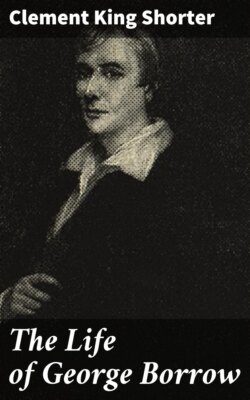Читать книгу The Life of George Borrow - Clement King Shorter - Страница 8
На сайте Литреса книга снята с продажи.
ОглавлениеWe may pass over the brief sojourn in Norwich that was Borrow’s lot in 1814, when the West Norfolk Militia left Scotland. When Napoleon escaped from Elba the West Norfolk Regiment was despatched to Ireland, and Captain Borrow again took his family with him. We find the boy with his family at Clonmel from May to December of 1815. Here Borrow’s elder brother, now a boy of fifteen, was promoted from Ensign to Lieutenant. In January, 1816, the Borrows moved to Templemore, returning to England in May of that year. Borrow, we see, was less than a year in Ireland, and he was only thirteen years of age when he left the country. But it seems to have been the greatest influence that guided his career. Three of the most fascinating chapters in Lavengro were one outcome of that brief sojourn, a thirst for the acquirement of languages was another, and perhaps a taste for romancing a third. Borrow never came to have the least sympathy with the Irish race, or its national aspirations. As the son of a half-educated soldier he did not come in contact with any but the vagabond element of Ireland, exactly as his father had done before him. Captain Borrow was asked on one occasion what language is being spoken:
“Irish,” said my father with a loud voice, “and a bad language it is. . . . There’s one part of London where all the Irish live—at least the worst of them—and there they hatch their villainies to speak this tongue.”
And Borrow followed his father’s prejudices throughout his life, although in the one happy year in which he wrote The Bible in Spain he was able to do justice to the country that had inspired so much of his work:
Honour to Ireland and her “hundred thousand welcomes”! Her fields have long been the greenest in the world; her daughters the fairest; her sons the bravest and most eloquent. May they never cease to be so. [33a]
In later years Orangemen were to him the only attractive element in the life of Ireland, and we may be sure that he was not displeased when his stepdaughter married one of them. Yet the creator of literature works more wisely than he knows, and Borrow’s books have won the wise and benign appreciation of many an Irish and Roman Catholic reader, whose nationality and religion Borrow would have anathematised. Irishmen may forgive Borrow much, because he was one of the first of modern English writers to take their language seriously. [33b] It is true that he had but the most superficial knowledge of it. He admits—in Wild Wales—that he only knew it “by ear.” The abundant Irish literature that has been so diligently studied during the last quarter of a century was a closed book to Borrow, whose few translations from the Irish have but little value. Yet the very appreciation of Irish as a language to be seriously studied in days before Dr. George Sigerson and Dr. Douglas Hyde had waxed enthusiastic and practical kindles our gratitude. Then what a character is Murtagh. We are sure there was a Murtagh, although, unlike Borrow’s other boyish and vagabond friend Haggart, we know nothing about him but what Borrow has to tell. Yet what a picture is this where Murtagh wants a pack of cards:
“I say, Murtagh!”
“Yes, Shorsha dear!”
“I have a pack of cards.”
“You don’t say so, Shorsha ma vourneen?—you don’t say that you have cards fifty-two?”
“I do, though; and they are quite new—never been once used.”
“And you’ll be lending them to me, I warrant?”
“Don’t think it!—But I’ll sell them to you, joy, if you like.”
“Hanam mon Dioul! am I not after telling you that I have no money at all?”
“But you have as good as money, to me, at least; and I’ll take it in exchange.”
“What’s that, Shorsha dear?”
“Irish!”
“Irish?”
“Yes, you speak Irish; I heard you talking it the other day to the cripple. You shall teach me Irish.”
“And is it a language-master you’d be making of me?”
“To be sure!—what better can you do?—it would help you to pass your time at school. You can’t learn Greek, so you must teach Irish!”
Before Christmas, Murtagh was playing at cards with his brother Denis, and I could speak a considerable quantity of broken Irish. [34]
With what distrust as we learn again and again in Lavengro did Captain Borrow follow his son’s inclination towards languages, and especially the Irish language, in his early years, although anxious that he should be well grounded in Latin. Little did the worthy Captain dream that this, and this alone, was to carry down his name through the ages:
Ah, that Irish! How frequently do circumstances, at first sight the most trivial and unimportant, exercise a mighty and permanent influence on our habits and pursuits!—how frequently is a stream turned aside from its natural course by some little rock or knoll, causing it to make an abrupt turn! On a wild road in Ireland I had heard Irish spoken for the first time; and I was seized with a desire to learn Irish, the acquisition of which, in my case, became the stepping-stone to other languages. I had previously learnt Latin, or rather Lilly; but neither Latin nor Lilly made me a philologist.
Borrow was never a philologist, but this first inclination for Irish was to lead him later to Spanish, to Welsh, and above all to Romany, and to make of him the most beloved traveller and the strangest vagabond in all English literature.
